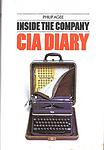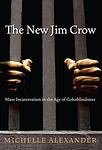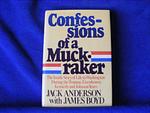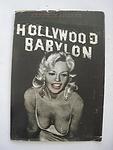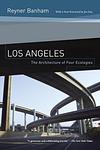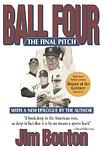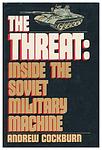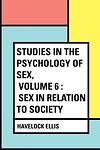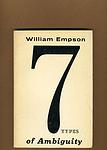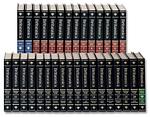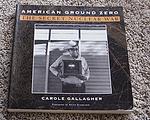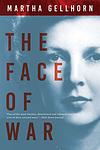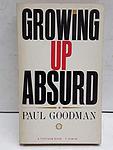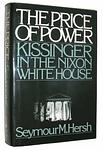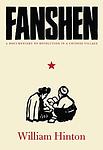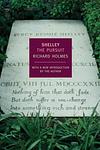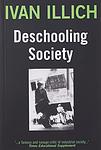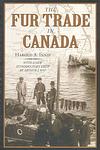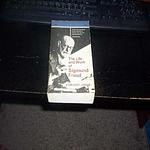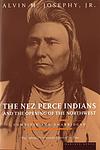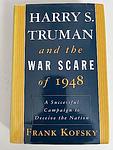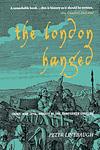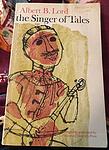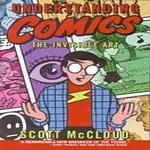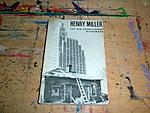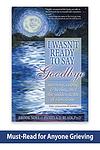100 Best Non-Fiction Books of the 20th Century (and Beyond) in English
This is one of the 305 lists we use to generate our main The Greatest Books list.
-
Desert Solitaire by Edward Abbey
Desert Solitaire is a collection of vignettes about life in the wilderness that reflects on the fierce beauty of the desert, the cruel indifference of nature, and the reckless destruction of the American West. The book, based on the author's experiences as a park ranger in Utah, explores the spiritual and philosophical dimensions of the desert environment, critiquing the commercialization and urbanization of the wild, and underscoring the importance of preserving natural landscapes.
The 828th Greatest Book of All Time -
Dynamite by Louis Adamic
"Dynamite" is a historical analysis that delves into the role of violence in American labor struggles from the post-Civil War era up to the early 20th century. The book meticulously documents various incidents, strikes, and conflicts between labor unions and industrial capitalists, highlighting how dynamite became a symbol and tool of resistance for disenfranchised workers. It explores the ethical and moral dimensions of using violence as a means of achieving labor rights, and critically examines the responses from corporations and the government. Through detailed narratives, the book provides insight into the complexities of labor movements and the extreme measures taken by both sides in the fight for workers' rights.
The 5947th Greatest Book of All Time -
Inside The Company: Cia Diary by Philip Agee
"Inside the Company: CIA Diary" is a detailed exposé written by a former CIA officer, providing an in-depth look into the operations and strategies of the Central Intelligence Agency during the 1960s and 1970s. The book reveals the inner workings of the agency through a personal diary format, detailing covert operations in Latin America and the methods used to manipulate politics and governments in the region. The author's account includes descriptions of espionage, political assassinations, and the training of paramilitary forces, shedding light on the ethical and moral dilemmas faced by CIA agents and the impact of U.S. foreign policy on global politics.
The 6091st Greatest Book of All Time -
A Pattern Language: Towns, Buildings, Construction by Christopher Alexander
This book is a seminal work in the field of architecture and urban design, presenting a holistic system for designing spaces at every scale, from regions and towns to individual buildings and rooms. It introduces 253 interrelated patterns that address the social, psychological, and practical needs of inhabitants, each pattern describing a problem and offering a core solution. The work emphasizes the importance of creating environments that are human-centered, harmonious, and adaptable, encouraging readers to apply these timeless patterns to create spaces that are aesthetically pleasing, functional, and inherently satisfying to live and work in.
The 2596th Greatest Book of All Time -
The New Jim Crow by Michelle Alexander
"The New Jim Crow" is a thought-provoking and eye-opening book that examines the deeply ingrained racial bias within the American criminal justice system. Drawing on extensive research and personal anecdotes, the author explores how the War on Drugs has disproportionately targeted and marginalized Black communities, leading to a modern-day system of racial control and oppression. This powerful critique challenges readers to confront the systemic racism that continues to perpetuate inequality and injustice in the United States.
The 2123rd Greatest Book of All Time -
Confessions Of A Muckraker by Jack Anderson
"Confessions of a Muckraker" provides an intriguing look into the life and career of a renowned investigative journalist who dedicated his work to exposing corruption and malpractice in American politics and business. The book delves into the challenges and dangers he faced, including threats to his life, as he pursued truth and accountability from powerful figures. Through a collection of revealing anecdotes and personal reflections, the memoir not only uncovers the gritty realities of muckraking journalism but also highlights the profound impact that diligent and fearless reporting can have on society.
The 6284th Greatest Book of All Time -
Hollywood Babylon by Kenneth Anger
This book provides a salacious and scandalous account of the dark side of Hollywood's Golden Age, revealing the shocking secrets and untold stories of some of the most famous and infamous stars. It delves into the tragic, scandalous, and sometimes criminal lives of Hollywood's biggest stars, including their drug addictions, sexual exploits, and untimely deaths. The author, a former child star and independent filmmaker, uses his insider knowledge to expose the seedy underbelly of the film industry.
The 5947th Greatest Book of All Time -
Eichmann in Jerusalem: A Report on the Banality of Evil by Hannah Arendt
This book is a thought-provoking exploration of the trial of Adolf Eichmann, a major organizer of the Holocaust. The author argues that Eichmann was not a fanatical ideologue, but rather an ordinary individual who simply followed orders and bureaucratic procedures, highlighting the terrifying potential for evil in any system that values obedience over personal responsibility. The concept of the "banality of evil" is introduced, suggesting that horrific acts can be committed by ordinary people under certain conditions.
The 977th Greatest Book of All Time -
Mushrooms Demystified by David Arora
This comprehensive guide to mushrooms offers an in-depth look at the fascinating world of fungi, providing detailed descriptions, identification techniques, and ecological information. Aimed at both beginners and experienced mycologists, the book covers over 2,000 species with extensive keys for identification, supplemented by hundreds of black and white illustrations. It also includes practical advice on collecting, preparing, and preserving mushrooms, making it an essential resource for anyone interested in the study or enjoyment of fungi.
The 6648th Greatest Book of All Time -
The Devil Finds Work by James Baldwin
"The Devil Finds Work" is a compelling essay that critiques the portrayal of race and identity in American cinema. Through personal reflections and sharp analysis, the author examines how movies have both shaped and reflected the racial prejudices and societal norms of their times. The essay delves into various films, critiquing their narratives and the roles offered to Black actors, while intertwining the author's own experiences with race, media, and his evolving consciousness. This work challenges readers to reconsider the impact of cinema on individual perception and broader cultural attitudes towards race.
The 4363rd Greatest Book of All Time -
Los Angeles by Reyner Banham
"Los Angeles" is a comprehensive exploration of the architectural and cultural landscape of Los Angeles, offering an in-depth analysis of its unique urban layout and iconic built environment. The book delves into the city's development, examining how the interplay of geography, climate, and technology has shaped its distinctive sprawl and auto-dependency. Through a series of thematic chapters, the author provides insights into the city's major architectural sites and styles, from the famous beachfronts to the expansive suburbs, highlighting how Los Angeles has often been at the forefront of architectural innovation and urban planning.
The 5947th Greatest Book of All Time -
Trampling Out The Vintage by Frank Bardacke
"Trampling Out The Vintage" is a comprehensive historical account of the United Farm Workers (UFW) movement, focusing on its charismatic leader, Cesar Chavez, and the broader labor struggles of farm workers in the United States. The book delves into the intricacies of union politics, the challenges of organizing in the agricultural sector, and the impact of Chavez's leadership style on the movement's trajectory. It provides a detailed examination of the UFW's rise to prominence in the 1960s and 1970s, its successes and setbacks, and the complex dynamics between workers, union leaders, and growers, offering a critical analysis of the factors that shaped the labor landscape in American agriculture.
The 9414th Greatest Book of All Time -
Ways Of Seeing by John Berger
This book is a seminal work of art criticism that challenges traditional Western cultural aesthetics by examining the ways in which we culturally learn to view art, particularly the impact of modern mass-reproduction on our experience of seeing. The author argues that the context, or "gaze," through which we perceive art significantly affects its meaning and our appreciation of it. The book also explores the portrayal of women in art and society, the relationship between art and ownership, and the connection between historical context and visual perception. It is a provocative critique that encourages readers to reconsider the role of visual imagery in our everyday lives and the power structures inherent in the act of looking.
The 799th Greatest Book of All Time -
You Can’t Win by Jack Black
"You Can’t Win" is a captivating autobiography that delves into the life of a professional thief and safe-cracker in the late 19th and early 20th centuries. The narrative provides a gritty, firsthand account of the author's experiences in the criminal underworld, detailing his encounters with various criminals, hobos, and the harsh realities of a life of crime. The book also explores themes of addiction, incarceration, and the author's eventual disillusionment with the criminal lifestyle, leading to his advocacy for prison reform. Through its vivid storytelling and introspective analysis, the memoir offers a window into a bygone era and a subculture often hidden from society’s view.
The 5947th Greatest Book of All Time -
The American Crucible by Robin Blackburn
"The American Crucible" furnishes a comprehensive analysis of the politics and power dynamics of slavery and emancipation across the Americas from the colonial period through the 19th century. It explores how the interplay of various economic, cultural, and political forces influenced the systems of slavery and their eventual dismantlement in regions such as the Caribbean, Brazil, and the United States. The book delves into the contradictions of these slave systems and the global impact of their existence, examining the struggles for power among different social groups and the ideologies that underpinned and justified slavery and its abolition.
The 9414th Greatest Book of All Time -
The Crime And Punishment Of I. G. Farben by Joseph Borkin
"The Crime and Punishment of I.G. Farben" explores the dark history of the German chemical conglomerate I.G. Farben, which played a significant role in supporting Nazi war efforts and exploiting forced labor during World War II. The book delves into the company's development of Zyklon B, used in the gas chambers, and its post-war repercussions, including the Nuremberg Trials where several executives were prosecuted. The narrative critically examines the moral and ethical responsibilities of corporations in wartime, highlighting the complex interplay between industry and government in the machinery of genocide.
The 6247th Greatest Book of All Time -
Ball Four by Jim Bouton
The book is a candid and controversial diary of a professional baseball season. The author, a pitcher, provides an insider's perspective on the sport, revealing the daily grind, locker room antics, and the pressures and politics of the game. The book also delves into the personal lives of the players, touching on their struggles with family, fame, and substance abuse. Despite the backlash it received from the baseball community, the book is considered a groundbreaking work for its honest portrayal of the sport.
The 2134th Greatest Book of All Time -
Labor’s Untold Story by Richard Boyer, Herbert Morais
"Labor’s Untold Story" is a comprehensive examination of the American labor movement, highlighting the struggles and achievements of workers from the early days of the industrial revolution to the mid-20th century. The book delves into the often-overlooked conflicts, victories, and significant figures in labor history, emphasizing the harsh conditions and exploitation workers faced, as well as their resilience and solidarity in fighting for better wages, working conditions, and rights. Through detailed narratives, the authors aim to shed light on the critical role labor has played in shaping American society and its economic policies, advocating for a greater appreciation and understanding of the worker's plight and contributions.
The 5947th Greatest Book of All Time -
The Encyclopedia Of Organic Gardening by Marshall Bradley, Fern Bradley, Barbara Ellis
This comprehensive guide serves as an essential resource for gardeners seeking to embrace organic practices in their gardening. Covering a wide range of topics, the book delves into the principles of organic gardening, including soil management, composting, pest control, crop rotation, and the use of natural fertilizers. It offers detailed advice on growing vegetables, fruits, herbs, and flowers organically, along with practical tips for planning and maintaining a healthy, sustainable garden. The guide also addresses modern concerns in organic gardening, such as water conservation and environmentally friendly landscaping techniques, making it a valuable reference for both novice and experienced gardeners committed to organic principles.
The 6247th Greatest Book of All Time -
Labor And Monopoly Capital by Harry Braverman
"Labor and Monopoly Capital" is a critical analysis of the impact of capitalism on the labor process. It explores how the rise of monopolistic corporations during the 20th century has led to the degradation of work, emphasizing the transformation and de-skilling of jobs as a consequence of technological advancements and management strategies. The book argues that these changes are primarily aimed at increasing control over the labor process and maximizing profitability, often at the expense of the worker's autonomy, skill set, and working conditions. This seminal work combines historical detail with a critique of contemporary labor practices, providing a comprehensive look at the dynamics of modern industrial capitalism and its effects on workers.
The 5947th Greatest Book of All Time -
For The Earth’s Sake by David Brower
"For the Earth’s Sake" is a collection of autobiographical essays by a prominent environmentalist who played a crucial role in the development of the modern environmental movement. The book details his experiences and reflections on decades of dedicated activism, including his involvement with influential environmental organizations and his efforts in promoting conservation campaigns that helped save vast tracts of wilderness. Through personal stories, the author emphasizes the urgency of environmental advocacy and the need for continued commitment to protecting the planet for future generations.
The 6965th Greatest Book of All Time -
Life Against Death by Norman O. Brown
"Life Against Death" is a provocative psychoanalytical study that explores the role of sexuality in Western culture and examines how the repression of libidinal desires is linked to destructive behaviors. The author draws extensively on the theories of Sigmund Freud, particularly his concept of the death drive, to argue that the neuroses of society can be traced back to the stifling of basic human urges. The book challenges traditional views on civilization's progress by suggesting that true liberation can only be achieved through the integration of erotic energy into all aspects of life, advocating for a revolutionary approach to psychoanalysis that embraces the transformative power of Eros.
The 5947th Greatest Book of All Time -
The Road to Oxiana by Robert Byron
This travelogue chronicles a journey through Persia and Afghanistan in the 1930s, capturing the author's keen observations of the architecture, landscapes, and people he encounters. The narrative combines historical research, personal anecdotes, and vivid descriptions, providing a unique insight into these regions during this period. The author's witty and engaging style, combined with his passion for architecture, makes this book not just a travel diary but a valuable piece of cultural and historical documentation.
The 871st Greatest Book of All Time -
Silent Spring by Rachel Carson
This influential environmental science book presents a detailed and passionate argument against the overuse of pesticides in the mid-20th century. The author meticulously describes the harmful effects of these chemicals on the environment, particularly on birds, hence the metaphor of a 'silent spring' without bird song. The book played a significant role in advancing the global environmental movement and led to a nationwide ban on DDT and other pesticides in the United States.
The 61st Greatest Book of All Time -
What Is History? by E. H. Carr
The book explores the nature of historical knowledge, examining the role of the historian in shaping history through the selection and interpretation of facts. It challenges the objective stance of historians, arguing that history is an ongoing dialogue between the past and present, influenced by the societal, political, and personal biases of its narrators. The work delves into the impact of societal structures and the individual agency, advocating for a more nuanced understanding of historical processes and the subjective elements that inevitably enter into the recording of history.
The 5947th Greatest Book of All Time -
The Legacy Of Malthus by Allan Chase
"The Legacy of Malthus" is a critical examination of the pseudoscientific foundations and social repercussions of eugenics, tracing its impact from the 19th century to its disturbing role in Nazi ideology and beyond. The book argues that the eugenic movements, rooted in flawed interpretations of Charles Darwin's theories, were driven by elitist and racist agendas that sought to justify inequalities and perpetuate discrimination. Through meticulous research, the author exposes how these biased beliefs infiltrated various aspects of public policy and societal norms, challenging readers to recognize and confront the lingering influences of these dangerous ideas in contemporary society.
The 6221st Greatest Book of All Time -
The Country Blues by Samuel B. Charters
"The Country Blues" is a seminal exploration of the origins and development of the blues genre, particularly focusing on its rural roots. The book delves into the lives and music of early blues musicians, tracing the evolution of the blues from its beginnings in the American South. Through detailed analysis and personal interviews, the narrative captures the profound emotion and cultural significance of the blues, highlighting its impact on American music history. The author's research and storytelling provide a deep appreciation of the genre's artistic depth and its role as a voice for its community.
The 5947th Greatest Book of All Time -
The Fateful Triangle by Noam Chomsky
"The Fateful Triangle" explores the complex relationships and political dynamics between the United States, Israel, and Palestine. The book critically examines how U.S. foreign policy, particularly its unwavering support for Israel, has impacted the Israeli-Palestinian conflict. Through a detailed analysis of historical events, media coverage, and political rhetoric, the author argues that this triangular relationship has perpetuated injustice and hindered a peaceful resolution in the Middle East. The work challenges readers to reconsider the narratives commonly accepted in Western media and political discourse, advocating for a more nuanced and equitable approach to Middle Eastern politics.
The 6539th Greatest Book of All Time -
The Threat by Andrew Cockburn
"The Threat" examines the development and consequences of the United States' obsession with high-tech weaponry and military strategies. The book critically explores how this fixation on advanced technology often overshadows more practical and effective forms of warfare, leading to significant strategic failures and a bloated defense budget. Through detailed analysis and case studies, the narrative delves into the politics, economics, and biases that drive America's military-industrial complex, questioning the efficacy and sustainability of current defense practices.
The 8054th Greatest Book of All Time -
I, Claud by Claud Cockburn
"I, Claud" is a memoir that offers a humorous and insightful look into the life and adventures of Claud Cockburn, a renowned British journalist. Through a series of engaging anecdotes, Cockburn recounts his experiences from the 1920s to the 1940s, covering his work in various parts of the world, his involvement in significant historical events, and his interactions with key figures of the time. The book provides a unique perspective on the political and social dynamics of the era, all delivered with Cockburn’s characteristic wit and sharp commentary.
The 5947th Greatest Book of All Time -
Nature’s Metropolis by William Cronon
"Nature's Metropolis" explores the dynamic relationship between Chicago and its surrounding rural hinterland in the 19th century, illustrating how the city served as a pivotal hub in the development of the American West. The book delves into the economic and ecological transformations driven by Chicago's rise, examining how it became a central market and transit point for commodities like lumber, grain, and meat. Through detailed analysis, the work reveals the complex interdependencies between urban and rural environments, showing how the city's growth was intrinsically linked to the exploitation and management of natural resources, ultimately shaping the broader American landscape and economy.
The 6965th Greatest Book of All Time -
French Provincial Cooking by Elizabeth David
This book is a comprehensive guide to traditional French cuisine, offering a deep dive into the regional dishes that define the culinary landscape of France. The author provides not only recipes but also historical context and personal anecdotes, which enrich the reader's understanding of French food culture. The book is celebrated for its detailed and passionate descriptions of ingredients and techniques, making it both an educational resource and a source of inspiration for cooks looking to bring authentic French flavors into their own kitchens.
The 5947th Greatest Book of All Time -
My Journey to Lhasa by Alexandra David-Neel
This book is a fascinating travel memoir documenting the author's daring and perilous journey to Lhasa, the capital of Tibet, in 1923. Disguised as a beggar and accompanied by a young Tibetan monk, she traversed harsh terrains, braved extreme weather conditions, and evaded authorities who forbade foreigners from entering the city. Throughout her journey, she encountered various aspects of Tibetan culture, religion, and way of life, offering an insightful and vivid portrayal of a land and people largely unknown to the outside world at that time.
The 4070th Greatest Book of All Time -
Custer Died For Your Sins by Vine DeLoria, Jr.
"Custer Died For Your Sins" is a critical and insightful examination of the treatment of Native Americans by the United States government and society. The book, written by a Native American author, challenges the historical narrative and policies that have marginalized Indigenous peoples. It combines humor, scholarship, and activism to address issues such as broken treaties, cultural appropriation, and the civil rights struggles of Native Americans. The author advocates for a better understanding and respect for Native American rights, cultures, and sovereignty, urging a reevaluation of mainstream American history and a more equitable approach to Native American issues.
The 5947th Greatest Book of All Time -
Geronimo by Angie Debo
"Geronimo" is a comprehensive biography that delves into the life of the renowned Apache leader, known for his indomitable spirit and resistance against both Mexican and United States forces in their attempts to subjugate his people. The book meticulously chronicles Geronimo's role in the Apache wars, his eventual capture, and his life as a prisoner of war. Through detailed research and vivid narrative, the biography not only explores Geronimo's military tactics and leadership qualities but also provides a broader commentary on the struggles of the Apache people during a period of intense conflict and change, highlighting the broader implications of Native American resistance during the westward expansion of the United States.
The 6124th Greatest Book of All Time -
War Without Mercy by John W. Dower
This book provides a detailed analysis of the racial aspects that influenced the Pacific War during World War II. It explores the racial stereotypes, propaganda, and policies that were used by both the United States and Japan, and how these factors contributed to the extreme violence and hatred that characterized the conflict. The book also examines the impact of these racial attitudes on the post-war relations between the two countries.
The 4787th Greatest Book of All Time -
The Greeks And The Irrational by E.R. Dodds
In "The Greeks and the Irrational," the author explores the concept of irrationality within ancient Greek culture, challenging the traditional view of the Greeks as pioneers of rational thought. The book delves into various aspects of Greek society, including religion, philosophy, and literature, to uncover the presence and acceptance of irrational elements such as divine inspiration, prophecy, and mystical practices. By examining these aspects, the work argues that irrationality was integral to the Greek worldview and that acknowledging this can lead to a more nuanced understanding of ancient Greek civilization and its contributions to Western thought.
The 5947th Greatest Book of All Time -
The Souls of Black Folk by W. E. B. Du Bois
This seminal work is a collection of essays that explores the history and condition of African Americans at the turn of the 20th century. It delves into the issues of race, class, and the socio-economic realities faced by black people post-emancipation. The author employs a combination of history, sociology, and personal narrative to present a powerful critique of American society, highlighting the struggle for civil rights, the importance of black spirituals, and the concept of "double consciousness" - the idea of viewing oneself through the lens of a society that sees you as inferior.
The 481st Greatest Book of All Time -
Studies in the Psychology of Sex by Havelock Ellis
This book explores the psychology of sex, delving into a wide range of subjects including sexual inversion, erotic symbolism, sexual impulse in women, and the sexual impulse in men. It also covers the analysis of the sexual instinct, its development in childhood and adolescence, and its manifestations in adulthood. The author uses a scientific approach, drawing on extensive research and case studies to provide a comprehensive understanding of the topic. It's considered a pioneering work in the field of sexology.
The 2134th Greatest Book of All Time -
Seven Types Of Ambiguity by William Empson
"Seven Types of Ambiguity" is a seminal work of literary criticism that explores the complex and nuanced ways in which ambiguity functions within poetry. The author meticulously analyzes various poems to illustrate how ambiguity can enrich a text by adding multiple layers of meaning, thereby enhancing the reader's interpretive experience. Through seven distinct types of ambiguity, ranging from simple misinterpretation to deeper, more intentional ambiguities embedded in the structure of language and syntax, the book argues that the recognition and appreciation of ambiguity is crucial to understanding the depth and complexity of poetic expression.
The 5947th Greatest Book of All Time -
Encyclopedia Britannica by Encyclopedia Britannica
This comprehensive reference work is a general knowledge English-language encyclopedia. It is written by about 100 full-time editors and more than 4,000 contributors, who have included 110 Nobel Prize winners and five American presidents. The encyclopedia is regarded as one of the most scholarly of encyclopedias, covering a wide range of topics in depth and providing extensive bibliographies.
The 765th Greatest Book of All Time -
The Dialectic Of Sex by Shulamith Firestone
"The Dialectic of Sex" is a radical feminist analysis that argues for the dismantling of traditional family structures and gender roles, positing that the oppression of women is intrinsically linked to their biological reproductive roles. The book critiques historical materialism and calls for a revolutionary reorganization of society, including the use of technology to liberate women from the tyranny of reproduction. It explores how these changes could lead to broader social and cultural transformations, advocating for a future where gender and sexual differences are irrelevant, and true equality can be achieved.
The 5947th Greatest Book of All Time -
How to Cook a Wolf by M. F. K. Fisher
This book is a classic guide to cooking and living well during times of scarcity and austerity. The author offers practical advice, recipes, and tips on how to make the most of limited resources. The book is not only a cookbook but also a philosophical treatise on the importance of enjoying life and finding beauty in simplicity. It's a testament to the author's belief that one can live well and eat deliciously even in times of hardship.
The 1595th Greatest Book of All Time -
A Dictionary Of Modern English Usage by H.W. Fowler
This book is a comprehensive guide to English usage that addresses grammar, syntax, style, and choice of words. It provides clear recommendations on how to navigate the complexities of the English language, offering explanations on the usage of particular words and phrases, and highlighting common mistakes. The guide is well-regarded for its practical advice, wit, and the author's strong opinions on linguistic matters, making it an essential resource for writers, editors, and anyone interested in the intricacies of the English language.
The 4086th Greatest Book of All Time -
Cézanne by Roger Fry
This book provides an insightful analysis of Paul Cézanne's life and artistic contributions, exploring how his work marked a significant shift in the trajectory of modern art. The author delves into Cézanne's unique approach to painting, emphasizing his methodical study of color and form, and his influence on the development of 20th-century art movements. Through a detailed examination of Cézanne's paintings and his impact on his contemporaries and successors, the book offers a comprehensive look at the artist's enduring legacy in shaping the direction of modern art.
The 5947th Greatest Book of All Time -
An Anatomy Of Criticism by Northrop Frye
"An Anatomy of Criticism" is a comprehensive work of literary theory that proposes an overarching framework for understanding the various forms and functions of literature. The book is structured around four essays, each exploring different modes of criticism: historical, ethical, archetypal, and rhetorical. The author argues for an interconnected system of literary criticism that transcends the limitations of individual perspectives and historical contexts. By categorizing literature into myths, genres, and symbols, the work aims to establish a universal structure for literary analysis, advocating for a more cohesive and scientific approach to criticism that emphasizes the inherent order and unity within the literary tradition.
The 5947th Greatest Book of All Time -
The Autobiography of Malcolm X by Alex Haley
This book is an autobiography narrating the life of a renowned African-American activist. It delves into his transformation from a young man involved in criminal activities to becoming one of the most influential voices in the fight against racial inequality in America. The book provides a deep insight into his philosophies, his time in prison, conversion to Islam, his role in the Nation of Islam, his pilgrimage to Mecca, and his eventual split from the Nation. It also addresses his assassination, making it a powerful account of resilience, redemption, and personal growth.
The 140th Greatest Book of All Time -
The Long Haul by Myles Horton
"The Long Haul" is an inspiring autobiography that delves into the life and work of Myles Horton, a prominent educator and social activist. The book chronicles Horton's journey in founding and developing the Highlander Folk School in Tennessee, an institution pivotal in training activists during the Civil Rights Movement and labor movements. Through personal anecdotes and reflections, Horton discusses the philosophy of participatory education and its role in empowering individuals to enact social change. His narrative not only highlights the challenges and successes faced in his lifelong commitment to justice and education but also serves as a powerful testament to the impact of grassroots educational efforts in the fight for equality and human rights.
The 6898th Greatest Book of All Time -
American Ground Zero by Carole Gallagher
"American Ground Zero" is a compelling photographic and narrative account that explores the devastating impact of nuclear testing on American citizens, particularly those living downwind of the Nevada Test Site during the Cold War era. The book combines poignant personal stories with striking black-and-white photographs, documenting the experiences of individuals and communities who suffered from radiation exposure due to government nuclear tests. These testimonials reveal the physical and emotional toll on the victims and highlight the long-term consequences of nuclear testing on public health and safety, raising critical questions about government accountability and the ethics of nuclear policies.
The 7093rd Greatest Book of All Time -
The Face Of War by Martha Gellhorn
"The Face of War" is a compelling collection of war correspondence by one of the 20th century's most famous war reporters. The book gathers firsthand reports from various major conflicts, including the Spanish Civil War, World War II, the Vietnam War, and the wars in Central America. Through vivid, unflinching prose, the author captures the human cost of war, focusing on the impact on soldiers and civilians alike. Her reports not only highlight the horrors and brutality of conflict but also the resilience and courage of the people she encounters. This collection serves as a poignant reminder of the personal stories behind the abstract facts of war.
The 2377th Greatest Book of All Time -
Detroit: I Do Mind Dying by Dan Georgakas
"Detroit: I Do Mind Dying" provides a vivid account of the radical labor and social movements in Detroit during the 1960s and 1970s. The book focuses on the activities of the Dodge Revolutionary Union Movement (DRUM) and the League of Revolutionary Black Workers, which sought to address systemic racism, exploitative labor practices, and the broader socio-economic disparities affecting black workers. Through a blend of historical narrative and personal testimonies, the book captures the intensity and passion of a pivotal moment in American labor history, highlighting the struggles and achievements of these revolutionary movements in their fight against industrial exploitation and racial injustice.
The 6091st Greatest Book of All Time -
Growing Up Absurd by Paul Goodman
"Growing Up Absurd" is a sociopolitical critique that explores the struggles of growing up in a society where the traditional routes to manhood – work, family, and citizenship – are increasingly invalidated. The author argues that this societal structure leads to widespread disaffection, mental illness, and juvenile delinquency among young people. He offers a profound analysis of contemporary culture and its effects on youth, also providing suggestions for societal change to address these issues.
The 2134th Greatest Book of All Time -
The Mismeasure of Man by Stephen Jay Gould
The book is a critical analysis of the history of scientific racism and biological determinism, the belief that social and economic differences among human races, sexes, and classes are inheritable, inevitable, and natural. It challenges the idea that intelligence can be measured accurately and placed in a single, linear scale. The author refutes the arguments of those who support these theories, arguing that they are based on flawed methodologies, biased data, and unverifiable assumptions. Instead, he proposes that intelligence is multifaceted and cannot be quantified simplistically.
The 812th Greatest Book of All Time -
The Greek Myths by Robert Graves
The book is a comprehensive and detailed guide to the ancient myths of Greece, presented in a narrative format. It explores the origins and histories of Greek gods, goddesses, heroes, and heroines, providing interpretations of the myths and discussing their variations. The author combines elements of archaeology, comparative mythology, and classical literature to offer insights into the historical and cultural contexts of these stories, making it an essential resource for anyone interested in classical mythology or the ancient world.
The 5947th Greatest Book of All Time -
Exploring The Dangerous Trades by Alice Hamilton
"Exploring The Dangerous Trades" is a pioneering work in the field of occupational health, written by a leading expert who delved into the hazardous environments of early 20th-century industrial America. The book provides a detailed examination of the health risks associated with various industries, such as lead, explosives, and the manufacture of pottery, and discusses the diseases and injuries common among workers in these fields. Through meticulous research and firsthand investigations, the author advocates for improved safety regulations and measures to protect workers from toxic substances and dangerous working conditions, highlighting the critical need for reform in industrial practices to ensure worker safety and health.
The 5947th Greatest Book of All Time -
Native Planters In Old Hawaii by E.C.S. Handy, Elizabeth Hand
The book explores traditional Hawaiian agriculture, focusing on the role of native planters in ancient Hawaii. It delves into the sophisticated farming techniques and systems developed by the indigenous people to cultivate crops like taro, sweet potatoes, and bananas. The text examines the spiritual and social aspects of agriculture, highlighting how farming was deeply intertwined with the religious beliefs and societal structures of the Hawaiian communities. Through detailed descriptions and analyses, the book provides a comprehensive understanding of how native Hawaiians expertly managed their resources and environment to sustain their society long before Western contact.
The 5947th Greatest Book of All Time -
Warriors by Gerald Hanley
"Warriors" is a compelling account of the author's experiences during World War II while stationed in Somalia. Tasked with leading Somali soldiers in the British Army, the author confronts not only the harsh realities of a brutal and unforgiving desert war against insurgent tribes but also grapples with the psychological toll of isolation and the moral complexities of leadership and colonialism. The narrative delves deeply into themes of courage, loyalty, and the human condition, offering a poignant exploration of the burdens carried by those in command.
The 5947th Greatest Book of All Time -
Themis by Jane E. Harrison
"Themis" is a scholarly work that delves into the origins and development of ancient Greek religion, focusing particularly on the social aspects of ritual and myth rather than the theological specifics. The book examines the concept of Themis, traditionally associated with divine order and law, and explores how this concept relates to the collective consciousness and practices of early Greek society. Through a detailed analysis of rituals, festivals, and myths, the author argues that Themis plays a central role in creating and maintaining social order and cohesion among the ancient Greeks. The study draws extensively on literary and archaeological sources to reconstruct the religious atmosphere of ancient Greece, providing insights into how early Greeks understood their world and the divine forces that shaped it.
The 5947th Greatest Book of All Time -
The Gospel Sound by Anthony Heilbut
"The Gospel Sound" provides a comprehensive exploration of gospel music, tracing its roots from the early 20th century through its evolution into a profound musical genre that has significantly influenced the landscape of American music. The book delves into the lives and careers of key figures in gospel music, examining both the cultural and spiritual elements that drive this genre. It discusses the impact of gospel on other music forms and its role in the civil rights movement, offering readers a deep appreciation of gospel's unique blend of the sacred and the transformative power of music in social and personal realms.
The 5947th Greatest Book of All Time -
The Price of Power by Seymour M. Hersh
"The Price of Power" offers a critical examination of the presidency of Richard Nixon with a particular focus on the Vietnam War. The book delves into the secretive and often manipulative tactics employed by Nixon and his administration, including the undermining of peace talks to secure his own political victory. It presents a detailed and disturbing account of political maneuvering, deception and abuse of power at the highest level of American politics.
The 2699th Greatest Book of All Time -
Bull Cook by George Leonard Herter, Berte Herter
This book is a unique and eclectic compilation that blends cooking recipes with personal anecdotes, historical facts, and unconventional wisdom. It serves as both a cookbook and a guide to various aspects of life, offering a wide range of recipes alongside tips on hunting, fishing, and general knowledge. The authors infuse their work with a distinctive voice, making it a memorable read for those interested in cooking and lifestyle tips delivered in an unconventional and straightforward manner. The content, while informative, is presented in a style that is both practical and entertaining, reflecting the authors' extensive experiences and personal views.
The 5947th Greatest Book of All Time -
The World Turned Upside Down by Christopher Hill
"The World Turned Upside Down" explores the radical ideas and beliefs that flourished during the English Revolution of the 17th century, a period of civil war, regicide, and the establishment of a republic. The book delves into the lives and thoughts of the Ranters, Diggers, Levellers, Quakers, and other groups who challenged the conventional religious and social order of their time. Highlighting how these groups sought to reshape an England they believed was in moral decline, the narrative provides a detailed look at the ferment of revolutionary ideas that questioned authority and tradition, advocating for radical changes in religion, politics, and society.
The 5947th Greatest Book of All Time -
Fanshen by William Hinton
The book is a detailed account of the agrarian reforms and social upheaval that took place in a small Chinese village during the 1940s, as the Chinese Communist Party sought to overthrow feudal systems and implement socialist ideologies. Through extensive firsthand observation and participation, the author provides an in-depth look at the process of "fanshen," which translates to "turning over," reflecting the profound transformations in land ownership, class structure, and power dynamics among the villagers. The narrative captures both the struggles and the successes of the villagers as they navigate the complexities of reform and revolution, offering a nuanced perspective on the broader impacts of political change in rural China.
The 5947th Greatest Book of All Time -
Shelley: The Pursuit by Richard Holmes
"Shelley: The Pursuit" is a comprehensive biography that delves into the tumultuous life and radical works of the Romantic poet Percy Bysshe Shelley. The book meticulously documents Shelley's passionate pursuits in both his personal life and literary career, exploring his relationships, ideological struggles, and the societal controversies he sparked. Through detailed research and engaging narrative, the biography captures the essence of Shelley's fervent spirit and his relentless quest for truth and justice, shedding light on his poetic genius and the circumstances that shaped his brief, yet impactful life.
The 5947th Greatest Book of All Time -
Deschooling Society by Ivan Illich
"Deschooling Society" is a critical discourse on the traditional and institutionalized education system, advocating for radical changes to deconstruct current structures of schooling. The book argues that the formal schooling system, as it stands, is counterproductive to learning, fostering dependency and limiting personal growth. It proposes a model where learning is decentralized, personalized, and driven by the learner's interests and needs. The author suggests the use of technology and networks to facilitate learning communities, rather than relying on compulsory, standardized, and hierarchical models of education. This shift, according to the book, would empower individuals and create true educational freedom.
The 5947th Greatest Book of All Time -
The Fur Trade In Canada by Harold A. Innis
"The Fur Trade in Canada" examines the pivotal role of the fur trade in the development of Canada, tracing its impact from the early days of French and British exploration and trade with Indigenous peoples through to its influence on economic and regional development. The book delves into the complex interactions between European traders and Indigenous communities, and how the demand for beaver pelts in Europe shaped the economic, social, and political landscapes of what would become Canada. The author uses extensive economic and historical analysis to argue that the fur trade was not merely an economic venture but a crucial factor in the formation of the Canadian nation.
The 5947th Greatest Book of All Time -
The Black Jacobins by C. L. R. James
The book is a seminal historical account of the Haitian Revolution, which took place at the end of the 18th century. It chronicles the brutal conditions of slavery in the French colony of Saint-Domingue and the subsequent uprising led by Toussaint L'Ouverture, a former slave who became a brilliant military and political leader. The narrative delves into the complex social and political dynamics of the time, including the influences of the French Revolution, and examines the broader implications of the successful slave revolt for colonialism and racism. The work is celebrated for its in-depth analysis and its passionate argument for the universal rights of all people to freedom and self-determination.
The 3400th Greatest Book of All Time -
The Life And Work Of Sigmund Freud by Ernest Jones
This biography provides a comprehensive look into the life and theories of one of the most influential figures in the field of psychoanalysis. It delves into his early life, education, and the development of his groundbreaking theories on the human psyche, dreams, and the unconscious. The book also explores his personal struggles, relationships, and the controversies that surrounded his work, offering an in-depth view of his professional achievements and the lasting impact of his ideas on psychology and psychotherapy.
The 5947th Greatest Book of All Time -
Blues People by Leroi Jones
"Blues People" is a seminal study that explores the sociocultural history of African Americans through their music, tracing the development of blues, jazz, and other musical forms from their roots in Africa to their transformation in America. The book argues that the evolution of black music reflects the changing social status and struggles of black Americans throughout the nation's history. It delves into how the music served as a form of cultural expression and resistance, and how it has been influenced by and has influenced American culture and society at large.
The 5947th Greatest Book of All Time -
The Nez Perce Indians And The Opening Of The Northwest by Alvin Josephy, Jr.
This book provides a comprehensive history of the Nez Perce tribe, focusing on their culture, interactions with European settlers, and their role in the development of the Northwest region of the United States. It delves into the tribe's resistance and adaptation in the face of expanding American frontiers during the 19th century, highlighting significant figures such as Chief Joseph. The narrative combines detailed historical accounts with the broader geopolitical implications of the tribe's struggle to maintain their lands and way of life amidst the pressures of colonization and changing governance.
The 5947th Greatest Book of All Time -
The Politics Of War by Walter Karp
"The Politics of War" explores the political maneuvers and decisions leading up to the United States' involvement in the Spanish-American War and World War I. The book delves into how political and business elites in the U.S. influenced public opinion and government policy to further their own interests, often at the expense of democratic principles and peace. Through detailed historical analysis, the work reveals the complexities and often hidden agendas behind America's march to war, challenging the traditional narratives of American heroism and highlighting the consequences of political power plays on national and global scales.
The 6284th Greatest Book of All Time -
For Keeps by Pauline Kael
"For Keeps" is a comprehensive collection of film criticism that spans the career of one of the most influential film critics of the 20th century. The book compiles reviews, essays, and critiques that cover a wide range of films, from classic Hollywood hits to lesser-known indie features. The author's sharp, witty, and often provocative commentary not only evaluates the films themselves but also delves into broader cinematic themes and the evolving landscape of the film industry. This anthology serves as both a reflection on the critic's extensive career and a significant contribution to film criticism, offering insights that are both deeply personal and universally resonant.
The 7768th Greatest Book of All Time -
Thelonious Monk by Robin D.G. Kelley
This biography delves into the life and music of Thelonious Monk, a pivotal figure in the jazz world, revealing the complexities of his character and his creative genius. Drawing on a wealth of documents and interviews, the book paints a detailed portrait of Monk's often challenging life, from his struggles with mental health and financial instability to his rich family life and his profound impact on the evolution of jazz. The author meticulously explores how Monk's unique style and compositions, characterized by dissonant harmonies and innovative rhythms, pushed the boundaries of jazz, earning him both critical acclaim and a lasting legacy in music history.
The 9234th Greatest Book of All Time -
The General Theory of Employment, Interest and Money by John Maynard Keynes
This influential economic treatise presents a groundbreaking theory that challenges classical economics, asserting that aggregate demand, driven by public and private sector spending, is the primary factor influencing economic activity and employment levels. The book also introduces the concept of fiscal and monetary policies as tools to manage economic downturns, thus shaping the foundation of modern macroeconomics. It further critiques the idea that market economies would automatically provide full employment and argues for active government intervention to prevent economic recessions and depressions.
The 351st Greatest Book of All Time -
Sexual Behavior in the Human Male by Alfred C. Kinsey
This book is a groundbreaking scientific study that provides an in-depth analysis of human male sexual behavior. It presents a comprehensive survey of male sexual activities and preferences, based on thousands of interviews and case studies. The book challenges many societal norms and taboos of its time by revealing the diversity and complexity of male sexual practices. It also explores the psychological, social, and biological factors that influence male sexuality.
The 784th Greatest Book of All Time -
Anatomy Of A War by Gabriel Kolko
"Anatomy of a War" provides a comprehensive analysis of the Vietnam War, delving into its historical roots, political maneuvers, and the social dynamics that shaped the conflict. The book critically examines the motivations and decisions of the key players, including the United States, North and South Vietnam, and other international actors, highlighting the complexities and contradictions that led to the war and its prolonged nature. It offers a detailed critique of American foreign policy and military strategy, arguing that ideological misconceptions and the failure to understand Vietnamese culture and political structures led to a devastating quagmire, with profound implications for both Vietnam and the United States.
The 6612th Greatest Book of All Time -
The Thirty Years’ War by Andrew Kopkind
"The Thirty Years’ War" provides an in-depth analysis of one of Europe's most prolonged and devastating conflicts, spanning from 1618 to 1648. The book delves into the complex interplay of religious, political, and social factors that fueled the war, primarily fought within the Holy Roman Empire. It examines the roles of key figures and the impact of the war on the civilian population, highlighting the immense human suffering and the significant political changes it precipitated, which reshaped the European landscape. The narrative also explores the diplomatic maneuvers and treaties, culminating in the Peace of Westphalia, which significantly influenced the concept of state sovereignty and the modern international system.
The 7889th Greatest Book of All Time -
Harry Truman And The War Scare Of 1948 by Frank Kofsky
The book delves into the political and military maneuvers of 1948, focusing on President Harry Truman and his administration's response to perceived threats from the Soviet Union. It argues that Truman exaggerated the Soviet threat to justify a massive military buildup, thereby securing public and Congressional support for increased defense spending and the implementation of a global containment strategy against communism. The author critically examines primary sources and declassified documents to challenge the traditional Cold War narrative, suggesting that domestic economic and political factors played a significant role in shaping U.S. foreign policy during this pivotal period.
The 7093rd Greatest Book of All Time -
Lame Deer by Richard Erodes, John Fire Lame Deer
The book is a compelling autobiography and spiritual manifesto that provides a profound insight into the life and beliefs of a Lakota Sioux medicine man. Through a series of personal narratives, reflections, and visions, the text delves into the rich tapestry of Native American life, revealing the deep spiritual and cultural heritage that has long been suppressed by mainstream society. It explores themes of identity, resistance, and the sacred, offering a powerful critique of the destructive impacts of colonization and a passionate call for cultural preservation and healing.
The 5947th Greatest Book of All Time -
The Divided Self by R.D. Laing
"The Divided Self" explores the nature of human identity and the fragile line between sanity and madness. The book delves into the inner lives of individuals diagnosed with schizophrenia, arguing that their experiences are profoundly misunderstood by conventional psychiatry. The author presents a compelling case that these individuals are not inherently disordered but are instead struggling to maintain a coherent self in a world that often rejects their unique perceptions and realities. Through vivid case studies and philosophical inquiry, the book challenges the reader to reconsider the nature of mental illness and the societal norms that define it.
The 5947th Greatest Book of All Time -
The Culture Of Narcissism by Christopher Lasch
The book explores the impact of individualism and the decline of community on American society, arguing that cultural changes since the mid-20th century have led to a rise in narcissistic personality traits. It delves into how consumer culture, changing family structures, and shifts in the workplace have fostered a focus on self-gratification at the expense of traditional values like authority and discipline. The author contends that this pervasive narcissism undermines social bonds and leads to a shallow, personality-driven approach to politics and personal relationships, ultimately eroding the fabric of society.
The 6284th Greatest Book of All Time -
Sketches Of Etruscan Places And Other Italian Essays by D. H. Lawrence
This book is a collection of travel writings by an early 20th-century British author, exploring the landscapes, art, and culture of the Etruscan civilization in Italy. The essays delve into the author's personal reflections and detailed observations on the ancient sites, artifacts, and the enduring influence of the Etruscans on Italian heritage. Through his vivid prose, the author not only paints a picture of the physical remnants of the Etruscan world but also philosophizes about the spiritual and cultural significance of these ancient people, contrasting their values with those of modern society.
The 5947th Greatest Book of All Time -
North Star Country by Meridel Le Sueur
"North Star Country" explores the rich tapestry of the American Midwest through a blend of history, folklore, and personal narrative, focusing particularly on Minnesota. The book delves into the lives of the region's diverse inhabitants, including Native Americans, fur traders, and immigrants, weaving their stories into a broader examination of the social and economic forces that have shaped the Midwest. Through vivid storytelling and lyrical prose, the narrative captures the spirit and struggles of the people who have called this part of America their home, reflecting on themes of community, hardship, and resilience.
The 5947th Greatest Book of All Time -
The London Hanged by Peter Linebaugh
"The London Hanged" is a historical analysis that delves into the economic and social aspects of capital punishment in 18th-century London. The book examines how the legal system, particularly through the use of public executions at Tyburn, was employed to control the laboring classes as London evolved into a capitalist economy. It explores the lives and trials of those sentenced to hang, not just for heinous crimes but often for petty thefts, reflecting the harsh penal codes of the time. The narrative connects these executions to broader themes of class struggle, economic exploitation, and the development of legal institutions that supported property rights over human rights, offering a critical look at the intersections of law, labor, and capital.
The 6965th Greatest Book of All Time -
The Singer Of Tales by Albert Bates Lord
"The Singer of Tales" explores the fascinating art of oral tradition, particularly focusing on the practice of storytelling among Serbo-Croatian singers. The book delves into how these oral poets compose and recount epic poems without the aid of written texts, relying instead on a formulaic system that allows for creativity within a framework of repetition and common phrases. Building on the work of Milman Parry, the study examines the mechanisms by which oral traditions are maintained and transmitted across generations, shedding light on the cognitive and cultural processes that underpin this ancient form of narrative art.
The 5947th Greatest Book of All Time -
A River Runs Through It by Norman Maclean
The book is a semi-autobiographical story that explores the lives of two brothers growing up in early 20th-century Montana under the stern watch of their minister father. The narrative beautifully intertwines the art of fly fishing with profound philosophical reflections on life, relationships, and the unbreakable bonds of family. Set against the majestic backdrop of the Montana wilderness, the story delves into the complexities of love, loss, and the pursuit of redemption through the lens of the brothers' contrasting life choices and destinies.
The 6124th Greatest Book of All Time -
Eastern Approaches by Fitzroy Maclean
"Eastern Approaches" is a thrilling memoir that recounts the adventurous experiences of a British diplomat and soldier during the 1930s and World War II. The author vividly describes his time in the Soviet Union during the Stalinist purges, his daring travels in Central Asia, and his pivotal role in the British military missions in North Africa and Yugoslavia. The narrative combines espionage, combat, and diplomatic intrigue, providing a unique insight into some of the most critical events and figures of the 20th century, including his interactions with prominent leaders like Josip Broz Tito.
The 4086th Greatest Book of All Time -
Understanding Comics by Scott McCloud
"Understanding Comics" is a comprehensive exploration of the comic book medium, its history, vocabulary, and the intricate ways it communicates through a unique combination of words and pictures. The book delves into the definition of comics, the various elements that make up the comic style, and the complex interplay between text and imagery in conveying stories and emotions. Using a comic book format to discuss its subject matter, the book also examines broader topics such as the psychology behind why humans are drawn to this form of storytelling and how comics fit into the broader spectrum of art and culture.
The 7093rd Greatest Book of All Time -
The Politics Of Heroin by Alfred McCoy
The book provides an exhaustive analysis of the global narcotics trade, particularly focusing on the involvement of various governments and intelligence agencies in the heroin trade throughout the 20th century. It delves into how these entities have facilitated and sometimes directly engaged in drug trafficking to finance military operations and political agendas, particularly in Southeast Asia during the Vietnam War. The work combines historical research, interviews, and on-the-ground investigation to expose the complex and often covert relationships between politics, warfare, and the global drug trade.
The 5947th Greatest Book of All Time -
Factories In The Fields by Carey McWilliams
"Factories in the Fields" is a seminal work that exposes the harsh realities faced by migrant farm workers in California during the early 20th century. The book provides an in-depth analysis of the agricultural industry, revealing how it operates much like an industrial factory, exploiting laborers who toil under severe conditions for minimal wages. It highlights the social, economic, and political challenges these workers encounter, including racial discrimination, inadequate housing, and lack of legal protections, drawing attention to the urgent need for reform in agricultural labor practices and policies.
The 5947th Greatest Book of All Time -
Advertisements for Myself by Norman Mailer
This book is a collection of short stories, essays, interviews, and previously unpublished works by a renowned author. It is a self-reflective exploration of his life, work, and philosophy. The author boldly critiques his own work, discusses his political and social views, and provides insight into his personal life. The book, controversial and provocative, serves as a fascinating study of the author's self-perception and creative process.
The 1269th Greatest Book of All Time -
The Heart Of Rock & Soul by Dave Marsh
"The Heart of Rock & Soul" is a passionate exploration of the 1001 greatest singles in rock and soul music history, as selected by the author, a renowned music critic. The book delves into the stories behind these influential songs, examining not only their musical significance but also their cultural impact. Through detailed analysis and personal anecdotes, the author provides a rich commentary on the evolution of rock and soul music, celebrating the diversity and depth of these genres. This comprehensive guide serves both as a critical assessment and a love letter to the enduring power of rock and soul music.
The 6844th Greatest Book of All Time -
The Machine In The Garden by Leo Marx
"The Machine in the Garden" explores the relationship between technology and the pastoral ideal in American culture. The book examines how the intrusion of industrialization and mechanization into rural, idyllic landscapes has been a persistent theme in American literature, reflecting broader societal tensions between nature and technology. Through a detailed analysis of literary works and historical events, the author argues that this dynamic symbolizes deeper conflicts in the American psyche regarding progress, environmental stewardship, and the quest for meaning in a rapidly changing world.
The 5947th Greatest Book of All Time -
In The Spirit Of Crazy Horse by Peter Matthiessen
The book delves into the conflict between the American Indian Movement (AIM) and the U.S. government during the 1970s, focusing particularly on the 1975 shootout on the Pine Ridge Indian Reservation. It examines the wrongful conviction of Native American activist Leonard Peltier for the murders of two FBI agents during this confrontation, presenting a critical analysis of the legal proceedings and the broader context of historical injustice against Native Americans. The narrative combines thorough research with personal accounts, highlighting the struggle for Native American rights and sovereignty, and questioning the fairness and integrity of the American justice system.
The 6539th Greatest Book of All Time -
Prejudices by H. L. Mencken
"Prejudices" is a collection of essays that offers a critical and humorous look at American culture and society in the early 20th century. The author provides biting commentary on a variety of topics, including literature, politics, and the arts, while also offering his own unconventional and often controversial viewpoints. The book is known for its satirical style and its critique of American life and values.
The 2779th Greatest Book of All Time -
The Air Conditioned Nightmare by Henry Miller
"The Air Conditioned Nightmare" is a critical exploration of American culture and society. Written after the author returned to the United States following a decade in Europe, the book is a collection of reflections and observations made during a road trip across the country. The author critiques the materialism, conformity, and spiritual emptiness he perceives in American life, contrasting it with the vibrancy and authenticity he experienced in Europe. Through vivid descriptions and philosophical musings, the work expresses a deep disillusionment with the so-called American Dream, presenting a stark, pessimistic view of the nation's culture and values during the mid-20th century.
The 5947th Greatest Book of All Time -
Listen, Yankee by C. Wright Mills
"Listen, Yankee" offers a compelling insight into the Cuban Revolution through a series of imagined conversations between a Cuban revolutionary and an American. The book, written during the height of Cold War tensions, seeks to explain and justify the motivations behind the revolution and Cuba's subsequent policies. It challenges American perceptions of Cuba and communism, providing a perspective that emphasizes social justice and reform. The work serves as both a critique of U.S. foreign policy and a call for understanding and solidarity between the American and Cuban people.
The 5947th Greatest Book of All Time -
The American Way of Death by Jessica Mitford
This book is a critical examination of the funeral industry in the United States. The author explores the various ways in which the industry exploits the grief and vulnerability of the bereaved to upsell expensive services and merchandise, often with little regard for the actual needs or desires of the deceased or their loved ones. She also delves into the cultural and societal norms around death and burial in America, questioning their origins and the extent to which they are perpetuated by the industry for profit.
The 1072nd Greatest Book of All Time -
The Masters Of Capital by John Moody
"The Masters of Capital" delves into the influential world of American financiers who played pivotal roles in shaping the economic landscape of the early 20th century. The book provides an insightful analysis of how these financial leaders, often referred to as "captains of industry," utilized their wealth and power to impact the development of key industries and influence government policies. Through detailed accounts of their business dealings and personal networks, the narrative explores the complexities of financial power and its far-reaching effects on the American economy and society.
The 5947th Greatest Book of All Time -
Japanese Homes And Their Surroundings by Edwin Morse
"Japanese Homes and Their Surroundings" explores the architecture, layout, and design of traditional Japanese homes, providing a detailed examination of the cultural and practical aspects that influence residential structures in Japan. The book delves into various elements such as construction materials, room functions, and the integration of nature with living spaces, reflecting the aesthetic and philosophical ethos of Japanese life. Through illustrations and descriptions, it offers insights into how these architectural forms foster a harmonious relationship between human habitation and the natural environment, highlighting the unique blend of simplicity, utility, and beauty in Japanese domestic architecture.
The 5947th Greatest Book of All Time
Counterpunch, 135 Books
In response to the proliferation of "best of the century" lists from major publications at the turn of the millennium, Jeffrey St. Clair and his colleague Alex decided to compile their own lists of the best books written and later translated into English during the 20th century. Their selections, aimed at the CounterPunch audience, diverged from mainstream choices, focusing instead on works that resonated deeply with their unique reader base. These lists became highly popular on the CounterPunch website, attracting over two million unique visitors and influencing librarians to reconsider the collections they maintained. However, a technical mishap during a website upgrade resulted in the loss of these carefully curated lists, likened humorously by Alex to the burning of the Library of Alexandria. Despite initial disheartenment, renewed interest and requests from the community prompted St. Clair to revisit and update these lists, reintroducing them with both cherished and new selections of non-fiction literature from the 20th century.
Added 13 days ago.
This list has a weight of 44%. To learn more about what this means please visit the Rankings page.
Here is a list of what is decreasing the importance of this list:
- Voters: 2 people voted
- List: only covers 1 specific language
- Voters: Voters seem to have an agenda/bias of some kind
- List: only covers 100 years
If you think this is incorrect please e-mail us at [email protected].


